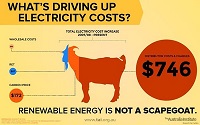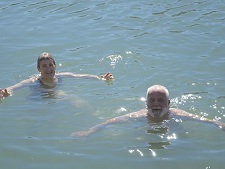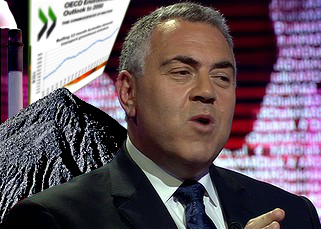We arrived at Purni Bore late on Day 1 of the Simpson Desert crossing after a long day. This photo was taken at 5.21 pm according to the camera: Continue reading Simpson Desert crossing 2: Purni Bore
Saturday salon 25/10

An open thread where, at your leisure, you can discuss anything you like, well, within reason and the Comments Policy. Include here news and views, plus any notable personal experiences from the week and the weekend.
For climate topics please use the most recent Climate clippings.
The gentleman in the image is Voltaire, who for a time graced the court of Frederick II of Prussia, known as Frederick the Great. King Fred loved to talk about the universe and everything at the end of a day’s work. He also used the salons of Berlin to get feedback in the development of public policy.
Fred would only talk in French; he regarded German as barbaric. Here we’ll use English.
The thread will be a stoush-free zone. The Comments Policy says:
The aim [of this site] is to provide a venue for people to contribute and to engage in a civil and respectful manner.
Here are a few bits and pieces that came to my attention last week.
1. Jacqui Lambie refuses an invitation to visit a Sydney mosque
“I’m a Catholic; I’m religious,” she said.
“It’s not my moral upbringing. I’m Australian. I simply believe in the church.
“… I wouldn’t be comfortable with that.”
No comment!
2. $4 billion hit to Queensland schools
Queensland schools are set to take a $4 billion hit to their revenues over the next decade due to cuts announced in the federal budget in May, according to the state’s education department.
Education Queensland’s analysis, obtained by the ABC in a Right to Information request, revealed Education Minister John-Paul Langbroek was advised that over the 10 years from 2014, state schools would be $1.66 billion worse off.
Non-government schools fared worse, with cuts totalling $2.284 billion.
The revenue reduction formed part of $80 billion in savings announced by the Federal Government in the areas of health and education.
Other states would be similarly placed, and comparable cuts in health funding are in the budget.
The good news is that the cuts apply from 2017 and there will have to be an election by 2016. So we’ll get what we vote for!
3. New York doctor diagnosed with Ebola
A harlem doctor returning from Guinea has contracted Ebola.
He took several trips on the subway in the past week, visited a bowling alley and took a cab before he began to display symptoms. His fiancée and two friends have been isolated.
Questions arise, I think, as to whether precautions were adequate. He was taking his temperature twice each day.
Contra the article, I heard on the radio that New Yorkers were calm, trusting their public institutions.
Joko Widodo, Indonesia’s new president, is a reform-minded technocrat who will need to make tough decisions if he wants to realise his grand ambitions to improve Indonesia’s creaking infrastructure, healthcare and education systems, analysts say.
He seems a man of principle who will take no nonsense. I wonder how he will view the funny games we play with asylum seekers.
I believe Al Jazeera has been airing an investigative report into the horrors of Australian offshore detention of asylum seekers.
5. Run silent, run deep in Canberra’s naval battles
The AFR has been severely hollowed out in Fairfax’s effort to make a buck, but Laura Tingle is still there. Recently she took a look at how we are going about acquiring submarines.
She reckons the politics wavers between regional concern for jobs and wanting to be mates with the Japanese. When senior LNP politicians were spruiking the possibility of saving billions by buying Japanese subs off the shelf, she says the subs were too slow and lacked the range to be useful in our context. Apparently there is no such thing as an off-the-shelf sub.
She has the impression that while the political talk “wobbles wildly” the Defence technocrats are moving “stealthily but relentlessly forward based on assessments of the best option from a Defence perspective.”
That’s a mercy, say I, once a bureaucrat!
6. Interesting houses
Via Mark’s Facebook, Los Angeles 1960:
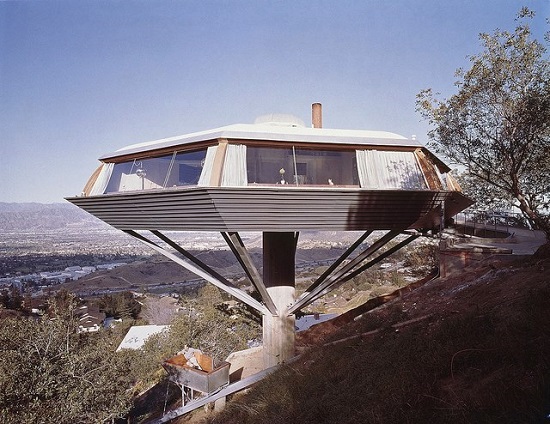
From the road:
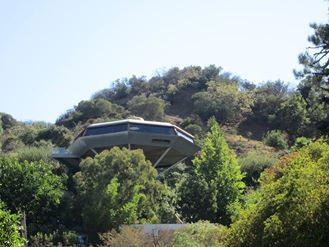
“Heliotrop”, University of Stuttgart’s “sunflower”-house which produces energy using a large photovoltaic sail on its roof:
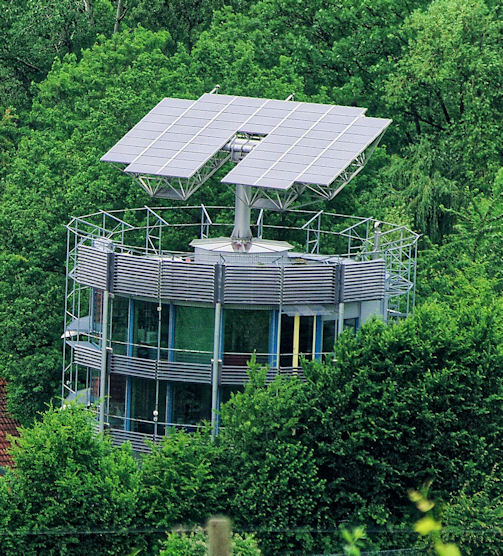
RET: the battle lines are drawn
The Renewable Energy target (RET) has been severely scapegoated on electricity prices according to The Australia Institute Facebook:
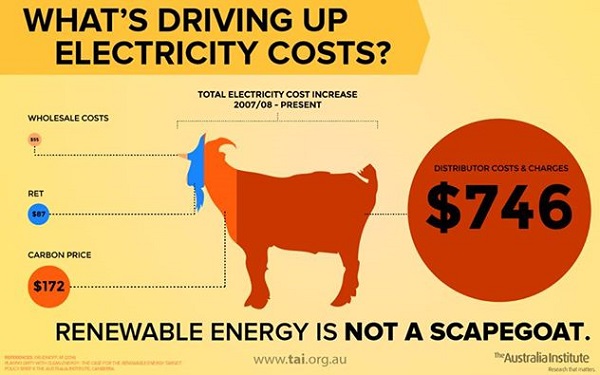
The Tea Party LNP Government and Labor have agreed to talk, to find a bipartisan position on the RET. The LNP has now set out what must be an ambit claim:
- The RET will constitute a so-called “real 20 per cent” of Australia’s electricity production.
- Emissions from intensives industries, including aluminium, copper, zinc and cement will be exempt.
- The small-scale solar panel scheme will remain untouched.
- Biannual reviews of the target will cease.
As background, the RET was legislated in 2009 as 41,000 gigawatt hours, representing 20% of the electricity estimated to be produced in Australia in 2020.
Since then electricity demand has collapsed, meaning the 41,000 gigawatt hour target is now closer to 27%.
This was Bill Shorten’s response:
“The government say they want a real 20 per cent, I call it a fraud 20 per cent, a fake 20 per cent. The truth of the matter is that renewable energy is part of our energy mix. It’s had a great benefit for a whole lot of consumers,” Mr Shorten said.
“We’ve seen thousands of jobs created…and we’ve seen billions of dollars of investment. The real damage that this government’s doing in renewable energy cannot be overstated.”
As John Davidson has been saying repeatedly, the damage is already very evident, as shown in this graph:
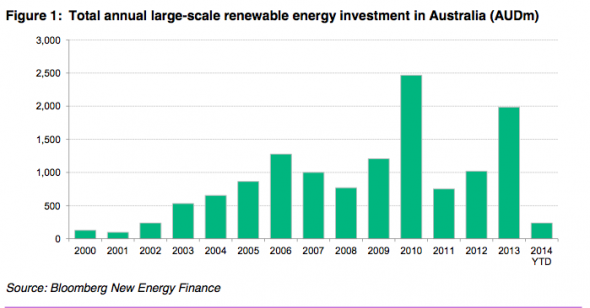
The renewables industry reaction:
But the renewable energy industry said the target as proposed would devastate the industry and jeopardise millions of dollars in investment.
Lane Crockett, general manager of PacificHydro, said: “What reason can there be [for this cut] other than to protect the coal industry?”
Ironically the LNP position would be seen as something of a win internally for Greg Hunt in the face of the climate scepticism that infects the governing parties.
On the matter of reviews, the LNP have been saying that the Warburton Review was required by legislation. I think the truth is that by law the review should be done by The Climate Authority, which still exists. According to Lenore Taylor at The Guardian:
The Climate Change Authority announced this week it was conducting its own review of the RET before December, as required under law.
I wonder who is paying their bills.
Giles Parkinson points out that The Climate Authority will look at the RET in terms of its contribution to reducing emissions rather than consumer prices. That is novel in the current environment – reviewing the RET in the light of its original purpose!
In that article Christine Milne in estimates hearings chewed out the PMs Department which ran the Warburton review for allowing the review to go beyond its terms of reference and recommending the most expensive options.
The Government is clearly in thrall of the fossil power lobbyists. Giles Parkinson again:
The Abbott government has confirmed that its opening position in talks with the Labor Party is for a “real” 20 per cent target, meaning that the amount of large scale renewable energy being built in Australia over the next 5 years could be cut by two thirds from the current target.
This was one of the key recommendations of the Warburton Review, which made the recommendation despite finding that the cost to consumers would be far less if it left the target at the current level of 41,000GWh by 2020, or made it a 30 per cent target by 2030. (Emphasis added)
Dick Warburton ended up as a very confused puppy. As John Davidson said:
Climate Spectator had this post on Dick Warburton, the Chair of the RET review committee and his performance on a Fran Kelly interview after his review had been released. It gives a picture of a man who doesn’t understand his own report or anything much else apart from the need to recommend the destruction of the RET and all the jobs it has created.
But the LNP are also responding to the popularity of rooftop solar where around “15,000 Australian households add rooftop solar each month, despite the disappearance of state-based feed in tariffs.” After all nine out of 10 households have considered or would consider installing roof-top solar.
Large scale investments are for decades rather than for years. Genuine bipartisanship to a long term commitment is needed. Even if an agreement can be cobbled together in the talks, there is a real question as to whether investors in large scale renewables in Australia will consider it worth the risk.
Abbott not rewarded for behaving badly
I heard the headline on the ABC news on Tuesday morning. The latest Newspoll showed that Australians overwhelmingly approved of Abbott’s statement about shirt-fronting Vladimir Putin. So I bought the Australian while I was out, and indeed they did – 63% in favour and only 27% against. They approved in all demographics – women 60%, the young 57% and Labor voters 51%. The headline was:
Abbott wins backing for Putin face-off
Actually, the story was almost relegated from the front page. It occupied one column on the far right. There was nothing positive about Labor on the front page, nothing at all. Nor in the headings and subheadings on page 2.
It’s something of a surprise to find, therefore, that this was the two-party preferred result:
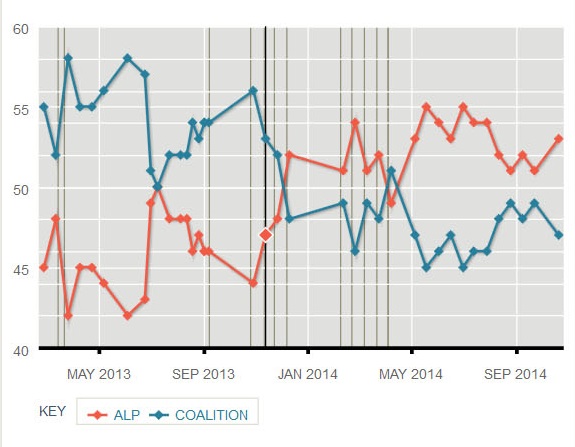
In TPP terms Labor had increased two points to be 53-47 ahead. That’s landslide territory, and a stunning result.
Curiously Labor’s primary vote had stayed the same at 34% while the LNP had lost 3 points to reside at 38%. Ostensibly their loss had gone to the Greens who were now at 14%.
Everyone understood that Abbott was playing to a domestic audience, most of all the Russians, where Julie Bishop and Putin have since had what seemed a sensible and calm chat about things that concern Australians. So far, at least, Abboitt has not been rewarded politically at home.
It’s true that the Morgan Poll had the TPP gap narrowing by a point to 52-48 in favour of Labor. Curiously the LNP primary vote was down half a point, while Labor was up by the same amount and the Greens and others remained the same. The difference was in the flow of preferences.
But the bottom line is that Morgan too saw no great move to the LNP and Labor is still in a comfortable winning position.
As an aside, Abbott would be well advised to keep his shirt-fronting to the metaphorical level. Putin is said to be a black belt in judo. As such he would have umpteen ways of ensuring that Abbott’s body momentum towards him would result in Abbott literally biting the dust.
Honouring Gough Whitlam
“Gough Whitlam changed the way Australia thought about itself and gave the country a new destiny. A more inclusive and compassionate society at home – a more engaged and relevant country abroad.
“He snapped Australia out of the Menzian torpor – the orthodoxy that had rocked the country asleep, giving it new vitality and focus. But more than that, bringing Australia to terms with its geography and place in the region.
“Along his journey he also renovated the Labor Party, making it useful again as an instrument of reform to Australian society.
“He will be missed by all who identified with his values and determination to see Australia a better place. But no one will miss him more than his family.”
From the SMH, that was Paul Keating’s summary. That will do me. If you start listing how he changed Australia, you are bound to miss something important, no matter how long the list. He was like no other. Comparison’s are pointless.
This morning I woke to Gerard Henderson on local ABC being mean-spirited about Whitlam’s “incompetence” and a prime minister. The ABC’s idea of ‘balance’. Other than that comments have been universally positive. Certainly politics was always interesting when Whitlam was in power, and he had some wild men in his cabinet.
For my own experience, two things stand out.
Firstly, early in 1975 I was separated from my wife and about 20 months later we had an amicably arranged no-fault divorce. Before Whitlam that would not have been possible. What often happened was that one partner engaged a private eye to catch the other in a compromising situation. Someone had to be at fault. In our case there was nothing to see. The marriage had simply ceased to work.
Secondly, when Whitlam was elected I was the first ever Supervisor, School Library Service, for the Queensland Government. School libraries had been in a dreadful state, but some progress had been made with the Commonwealth funded Secondary Schools Libraries Program. For primary schools we were trying to improve things but there was a desperate lack of resources.
Come the Whitlam government and we soon had a primary schools library program, plus lots of special needs programs and massive general funds for schools generally. I remember visiting Catholic parish primary schools that were literally falling down. I remember talking to a private school headmaster who said that he had always assumed that private school facilities were better. Not now. Government schools were building facilities as good or better than anything the private schools had to offer.
Overall, I recall for the first time feeling proud to be an Australian. We no longer had to apologise on multiple fronts.
This morning I learned something new about Whitlam. Susan Mitchell, who has a biography of Margaret Whitlam coming out soon, said he was actually a very shy man. And absolutely hopeless at small talk. Margaret had to cover that department for him.
My favourite story about Gough was the time he took the press gallery down to Manly beach. Gough strode out upon the waters, turned around, waved to the gallery and strode back to land without getting his feet wet. The headlines next day?
-
GOUGH WHITLAM CAN’T SWIM!
May he rest in peace. We will never see his like again.
Here’s Clifton Pugh’s 1972 portrait:
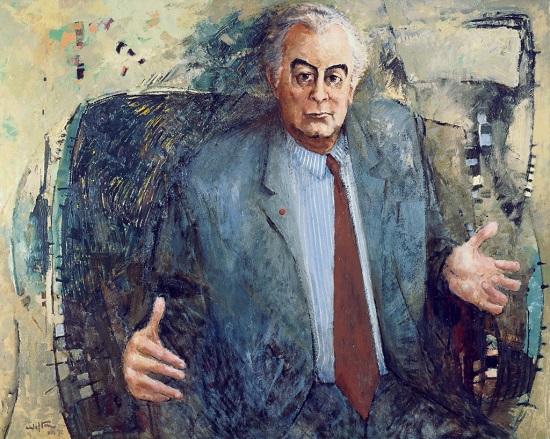
Update: Be sure to check out wpd’s list of achievements @ 2.
Update 2:
John Quiggin has done an excellent assessment of Gough Whitlam.
More than any other Australian political leader, and arguably more than any other political figure, Gough Whitlam embodied social democracy in its ascendancy after World War II, its high water mark around 1970 and its defeat by what became known as neoliberalism in the wake of the crises of the 1970s.
In all of this Whitlam is emblematic of the social democratic era of the mid-20th century. Despite the resurgence of financialised capitalism, which now saturates the thinking of all mainstream political parties, the achievements of social democracy remain central to our way of life, and politicians who attack those achievements risk disaster even now.
With the failure of the global financial system now evident to all, social democratic parties have found themselves largely unable to respond. We need a renewed movement for a fairer society and a more functional economy. We can only hope for a new Whitlam to lead that movement.
Elsewhere there’s Phillip Adams’ repeat of the 20th anniversary of the Dismissal.
Climate clippings 110
1. 25 climate change disasters
Business Insider, Australia tells us that 25 disasters may befall us from climate change. The assumptions are conservative – 2°C and half a metre of sea level rise by 2100, though the text sometimes specifies more. Some of the predictions are disturbing: Continue reading Climate clippings 110
Simpson Desert crossing 1: Mt Dare to Purni Bore
It was a long day, our first day in the desert, with some severe landscapes and four bodies of water. Within the first hour we had our first technical hitch (see earlier post) where a tap on our largest water container turned itself on, watering the road with about 17 litres of water before we remedied the situation: Continue reading Simpson Desert crossing 1: Mt Dare to Purni Bore
Saturday salon 18/10

An open thread where, at your leisure, you can discuss anything you like, well, within reason and the Comments Policy. Include here news and views, plus any notable personal experiences from the week and the weekend.
For climate topics please use the most recent Climate clippings.
The gentleman in the image is Voltaire, who for a time graced the court of Frederick II of Prussia, known as Frederick the Great. King Fred loved to talk about the universe and everything at the end of a day’s work. He also used the salons of Berlin to get feedback in the development of public policy.
Fred would only talk in French; he regarded German as barbaric. Here we’ll use English.
The thread will be a stoush-free zone. The Comments Policy says:
The aim [of this site] is to provide a venue for people to contribute and to engage in a civil and respectful manner.
Here are a few bits and pieces that came to my attention last week.
1. National curriculum review
The Conversation asked several experts to comment on the Review of the Australian Curriculum conducted by Dr Kevin Donnelly and Professor Ken Wiltshire. As far as I can make out, the Government will make a final response by early next year and hopes that changes can be implemented by the states in 2016.
This is insane.
The Review seems to call for a rewriting of the entire curriculum, a task which would take years.
Moreover, the Review calls for a restructuring of the Australian Curriculum Assessment and Reporting Authority (ACARA), the body which would do the rewriting, which will take time. It seems unlikely that the states will have the capacity to undertake the necessary curriculum development themselves.
The Review itself seems to be based on opinion rather than research.
2. Calls to sack curriculum reviewer
One such opinion is that of Professor Barry Spurr of Sydney University, who was used as a consultant to review the teaching of English. Spurr has been suspended while the university investigates calls for his sacking. As reported on PM calls for his sacking:
follow the publication of a series of emails in which Professor Barry Spurr described Aboriginal people as “human rubbish tips” and reminisced about the 1950s, when there weren’t so many “bogans”, “fatsoes”, “Mussies” and “Chinky-poos” around.
In his review, Professor Spurr advised the Government to focus less on teaching Aboriginal and Torres Strait Islander literature and place greater emphasis on western Judeo-Christian culture.
On reading the original New Matilda report it’s hard to accept that his racist, sexist ranting is merely whimsical word games. See also here and here.
3. Classics in the English curriculum
While we are at it, Stewart Riddle and Eileen Honan took a look at the curriculum review and English literature. Remember that the Review
advised the Government to focus less on teaching Aboriginal and Torres Strait Islander literature and place greater emphasis on western Judeo-Christian culture.
They found that the national curriculum leaves the selection of texts entirely up to the schools. In fact as a result students already get a steady diet of the classics. But they probably don’t read the Bible or as six year-olds commit mediaeval verse to memory as suggested by the reviewers.
4. Five new growth centres for science and innovation
The Federal Government’s adding an extra $400 million to the science and technology budget. Five new “growth centres” are at the heart of the plan – mining, oil and gas, medical, food and advanced manufacturing.
The Government says that should boost growth and create jobs by encouraging co-operation between those sectors and the scientific community.
Sounds wonderful if you stop right there. But then this:
But the new centres will replace some existing co-operative research centres and it’s not clear what it will mean for the nation’s top research body, the CSIRO.
Opposition spokesman Kim Carr is allowed a very general criticism. I heard him later on RN’s Drive. Apparently Labor had instituted 12 such centres, which were slashed by the LNP. Also the cutbacks to research, science and innovation total a whopping $9 billion.
The headline says $400 million, but the article specifies only $188 million of government funds.
Hockey’s plan to shrink Australia continues apace!
Hiccup Hockey fluffs his lines on the BBC
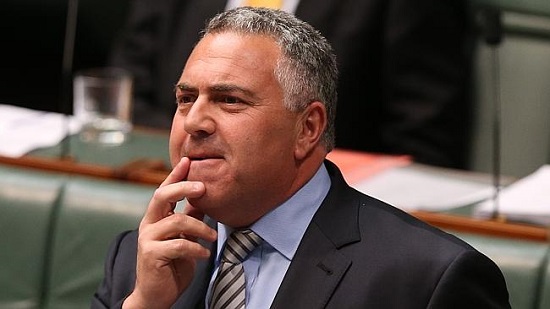
On one view Treasurer Joe Hockey made an absolute goose of himself on the BBC’s HARDtalk program the other day.
A kinder view is that Hockey and the interviewer, Stephen Sackur, were simply talking past each other. Sackur was talking about greenhouse emissions, Hockey was talking about coal exports. The question remains open as to whether Hockey understands the difference. In terms of the question he was actually asked, he was talking gibberish.
You can see the segment here or here. There are reports here and here. This is from the Australian Government transcript:
STEPHEN SACKUR:
Right, you sell an awful lot of coal in Asia and that raises questions about Australia’s commitment to cleaning up its act. You are one of the dirtiest, most greenhouse emitting countries in the OECD group of developed countries. Is your Government prepared to do anything to clean up its act?
TREASURER:
Well firstly, the comment you just made is absolutely ridiculous.
STEPHEN SACKUR:
Why?
TREASURER:
Well, Australia is a significant exporter of energy and in fact, when it comes to coal, we produce some of the cleanest coal, if that term can be used – the cleanest coal.
STEPHEN SACKUR:
(Inaudible) Highest per capita emitter of greenhouse gases of any nation in the OECD. So, what is wrong with what I am telling you? You are a very polluting nation and you have got a decision to make as a Government about whether you are prepared to do anything serious to change that.
TREASURER:
Stephen, I don’t accept the basis of your question, and why? Because we’ve got a small population and very large land mass and we are an exporter of energy, so that measurement is a falsehood in a sense because it does not properly reflect exactly what our economy is. We are on the threshold of becoming the biggest exporter of gas in the world. We are a major producer and exporter of coal. We are now selling uranium to India. We are an exporter – a trustworthy, reliable, predictable exporter of energy that is helping to drive the emergence of the middle-class in Asia. Now, that should be welcomed.
He goes on to say that the best way of tackling climate change is to help developing countries become richer, and to do this they need to burn more coal.
Greens will also be interested in Hockey’s reasoning as to why we need to increase the fuel excise:
The fundamental point is this: that we are asking Australians to pay an extra 40 cents a week in fuel taxes on average, in order to deliver the biggest road building program in Australian history.
Didn’t he promise Christine Milne that the extra funds would go on public transport? Seems she was right not to believe him.
I borrowed from Laurie Oakes’ story When Joe Hockey talks, Coalition colleagues wince for the title of this post. The story started:
HICCUP Hockey strikes again! Just when colleagues were starting to think the Treasurer might be getting his act together he produces another gaffe.
Oakes’ story was written before the BBC interview. Hockey’s was attempting to use national security to pressure Bill Shorten over Hockey’s stalled budget bills. Oakes termed this an appalling misjudgement.
“If Bill Shorten truly is honest about his commitment to deliver bipartisan support in relation to our defence efforts in the Middle East, he’ll provide bipartisan support to pay for it,” he said.
That time Abbott hastened to distance himself and to set the matter straight. Shorten was a true patriot, he said. This time, well you never know, he may agree with Hockey, being ignorant about climate change himself. Or perhaps he hoped we didn’t hear.
I think Laura Tingle got it right back in 2010, when she concluded Hockey and Andrew Robb were liars, clunkheads or both, but “whatever the combination, they are not fit to govern.”
That applies to the whole pack of them, Abbott and his front bench, with perhaps one or two notable exceptions.
9 Out of Ten Australian Households are Considering Solar
Continue reading 9 Out of Ten Australian Households are Considering Solar
Ebola: how bad will it be?
In Guinea, Sierra Leone and Liberia, three neighbouring West African countries, Ebola seems to be out of control. This is a graph of the numbers of new cases with projections for the next four weeks in lighter blue:
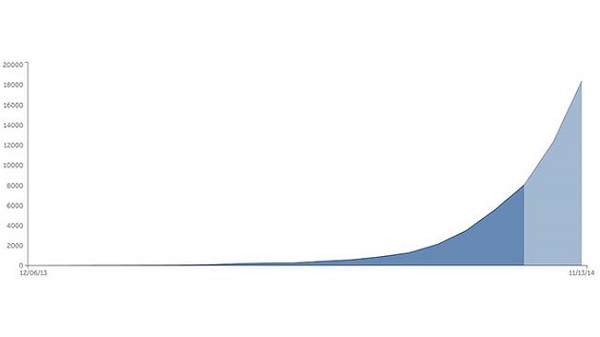
So far there have been about 8,400 cases and some 4,000 deaths. There are claims that cases in Liberia are doubling every 15-20 days while those in Sierra Leone are doubling every 30-40 days. By the end of the year there could be as many as 18,000 new cases weekly.
I’m impressed though that there has been no spread to other African countries other than Nigeria, where it appears to have been contained. One case surfaced in Lagos in July with 19 subsequent infections. However, the chain of contagion seems to have been broken.
On the other hand subsequent infections in the US, where a second health care worker has tested positive, and Spain are cause for concern.
You can read very different views of the potential impact of the disease worldwide. This Nature article is quite definite that the Ebola does not represent a global threat. The virus is too hard to catch and advanced country health systems are too sophisticted. By contrast this New York Times piece worries about the virus gaining a foothold in a mega-city somewhere else in the developing world. I’d worry about India and the capacity of its health system to cope.
The current outbreak is the first time the disease has gained a foothold in urban areas.
A second worry is that the virus may become airborne. C Raina MacIntyre, who is Professor of Infectious Diseases Epidemiology and Head of the School of Public Health and Community Medicine at UNSW, points out that experienced health care workers who have contacted the disease have not been able to identify how they caught it. The assumption is simply that there has been a breach in protocol. We keep being assured that the disease is hard to catch. While the long incubation phase, up to three weeks, does not help memory, the fact that it keeps happening in ways that can’t be precisely pinpointed is troubling.
Still, the circumstances that saw the disease take hold in West Africa are unlikely to be repeated. This Vanity Fair article explains how the spread of Ebola was assisted by unique circumstances.
Firstly Ebola was not identified for three and a half months. The disease was virtually unknown in West Africa; earlier outbreaks had been in central and east Africa. At first cholera, then Lassa fever were suspected. By the time Ebola was identified the disease had already spread to a number of towns, including a bustling trade hub.
The reaction of first world agencies was swift. After identification in late March, Guinea was invaded by strange robotic white people who came in space suits and took ill people away.
The foreigners had come so fast that they had actually out-run their own messaging: there were trucks full of foreigners in yellow space suits motoring into villages to take people into isolation before people understood why isolation was necessary.
To a villager, the isolation centers were fearsome places. They offered a one-way maze through white tarpaulins and waist-high orange fencing. Relatives or friends went in and then you lost them. You couldn’t see what was happening inside the tents—you just saw the figures in goggles and full-body protective gear. The health workers move carefully in order to avoid tears and punctures; from a distance, the effect is robotic. The health workers don’t look like any people you’ve ever seen. They perform stiffly and slowly, and then they disappear into the tent where your mother or brother may be, and everything that happens inside is left to your imagination. Villagers began to whisper to one another—They’re harvesting our organs; they’re taking our limbs.
The people in Guinea were as frightened by the response to Ebola as they were by Ebola itself. By May the cases dried up and the aid agencies started to relax. In fact the sick were hiding, as soon became apparent.
Rather than under control the reverse was true, the epidemic was completely out of control. While new strategies are gaining the trust of the people, the disease has outrun attempts to contain it.
There must be a huge effort to contain the disease within the three countries where then disease is endemic while a vaccine, currently under development, is fast tracked. As to Guinea, Liberia and Sierra Leone, we can’t just write off a combined population of over 20 million people. Health workers are in the front line and these countries human health worker resources are being depleted by the disease. Liberia has only 250 doctors left for 4 million people, that’s one for every 16,0000 people.
Yet Australia has seen no great obligation to help. Officially I understand we have supplied about $18 million in aid, a pathetic amount, while our fearless prime minister has said that it is too dangerous for us to put boots on the ground. Yet there is work to be done out of direct contact with patients, in building temporary field hospitals, for example. Our PM could show just a bit of compassion and genuine humanitarian concern.
Klein vs capitalism

In Climate clippings 106, item 6 I linked to Joe Romm’s part review of Naomi Klein’s new book, This Changes Everything: Capitalism Vs The Climate. Romm promised to look at Klein’s program for action in a second post. I’m still waiting. I’ll recap here Romm’s exposition of Klein.
Romm on Klein
Klein, he says, makes three essential points:
1. Because we have ignored the increasingly urgent warnings and pleas for action from climate scientists for a quarter century (!) now, the incremental or evolutionary paths to avert catastrophic global warming that we might have been able to take in the past are closed to us.
2. Humanity faces a stark choice as a result: The end of civilization as we know it or the end of capitalism as we know it.
3. Choosing “unregulated capitalism” over human civilization would be a “morally monstrous” choice — and so the winning message for the climate movement is a moral one.
The time for ‘evolutionary’ strategies is long past. Now only ‘revolutionary’ strategies will get us there. Unregulated capitalism is a Ponzi scheme, which must collapse. The real choice facing us is a moral one.
Unchecked capitalism is immoral and will destroy civilisation as we know it.
Gareth at Hot Topic
Across the ditch Gareth at Hot topic has reviewed Klein’s book. Ultimately, he says, Klein’s vision is a moral one. She seeks
“an alternative worldview to rival the one at the heart of the ecological crisis— embedded in interdependence rather than hyper-individualism, reciprocity rather than dominance, and cooperation rather than hierarchy.”
In summary:
We need this not only to create a political context to drastically lower emissions but also to help us through the disasters now unavoidable, where respect for human rights and deep compassion will be all that stands between civilisation and barbarism.
Klein seems to be saying that with a mass movement, as with the abolition of slavery, we can prevail.
She’s really saying, however, that to change capitalism we need to change ourselves. But capitalism has shaped us powerfully to suit it’s needs. Weber’s iron cage comes to mind.
I think the problem is a step up from that faced by the slavery abolitionists. Slavery was only about how the new world acquired labour for farming. When slavery was abolished the price of food may have gone up a bit, but I suspect not much. It has been pointed out that with slavery the landowner kept the whole family. Now farm workers in the New World and elsewhere often work for less than a living wage. Farming in Africa is often practiced by women, whereas the men go off to work in the mines and elsewhere.
Yuval Harari in his book Sapiens: a brief history of humankind reckons that the core concept of modern capitalism is growth. Prior to capitalism, in the first millennium for example, economics was a zero sum game. It was assumed that if you wanted to increase your wealth you would do it by diminishing someone else’s, through plunder, or a landowner screwing more out of the peasants. One’s assumption was generally speaking that the future would be worse than the past.
To skip a bit, by the 19th century we had the industrial revolution and a belief in science and progress. The belief that the future would be better than the past was pervasive. At the same time there were also worlds to being conquered through colonialism and imperialism.
Harari says that obviously exponential growth using more energy and materials must stop somewhere. But, he says, capitalists will tell you that only capitalists can run the world they have created and no-one has much stomach for new versions of communism. Just wait a bit, they say, and goodies will flow to all.
I’ve said elsewhere that our future will not be constrained by a limit on energy. Ultimately we will have access to as much as we need or want. With nanotechnology the same may be true of materials. There is a limit, however, on the goods and services provided by nature.
To cut a long story short, capitalism will I think stay. Our only option is to civilise it. Two of the elements will have to be greater democracy and an expansion of the public sector, the things we do collectively for the good of all. And there will need to be limits to wealth.
We must re-imagine the future. Meanwhile the Scandinavians could be nearer the mark than we are.
Meanwhile also, there is this fascinating interview with Klein.
She’s not a raving revolutionary. She wants to keep markets with greater government intervention and regulation. We are in an existential crisis; she doesn’t know what the next step is, just that we should all take it very seriously and engage. She intends to spend the rest of her life on the problem.


